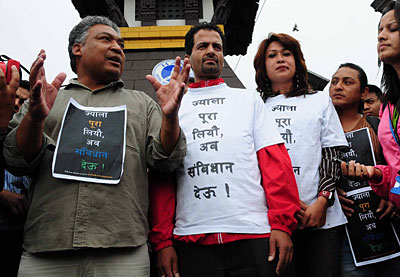 BR/KANTIPUR PAY FOR WORK: Social entrepreneur Anil Chitrakar and CA member Sunil Babu Pant at the Saturday's gathering, Maitighar Mandala. |
Two hundred Nepalis with no overt political affiliations gathered at Kathmandu's Maitighar Mandala last Saturday to make this point: despite being paid by taxpayers for the past two plus one years, 601 Constituent Assembly members have failed to draft a constitution.
Tomorrow, in greater numbers, the protestors plan to assemble outside the CA premises in New Baneswor to demand a constitution.
The future: At present, the political horizon looks uncertain. The extended deadline for completing the work for the constitution ends in two weeks. All indications spell that the CA is likely to vote to extend its term by six months to a year. Some speculate that the proposed extension may even be indefinite.
In any case we will be stuck with what will not be an elected CA, but a roguishly runaway CA controlled by a few party netas who are clever enough to mouth all the right words about inclusive democracy. Despite progressive-sounding pronouncements, these netas remain a class apart: they continue to take a lion's share of credit for the success of fading-from-the-memory past andolan; they are seemingly accountable to no one; and their modus operandi is about keeping all decisions uncertain so that they alone are seen as the 'deciders' of Nepali democracy.
The protest tomorrow must talk about how Nepal's future is bleak when the signals from the Kathmandu-centric political class remain muddled. In times of prolonged uncertainty, investors hesitate to buy, educated professionals emigrate, and marginalised Nepalis are left voiceless due to the partisanship of their local reps. We must not let each CA member continue to draw over Rs 50,000 of the taxpayers' money every month in cash and benefits without delivering.
Next generation: It's cliché that the Nepali population is young. 15 million out of 30 million Nepalis are 21 or younger. Yet Nepal's political discourse has never been about generational aspirations. What does the youth want to see in its future? And how can a new constitution help? These questions never figure into public discussions.
Tomorrow, the protestors must articulate their ideals for a future Nepal. Once this vision is engrained, then we can deliberate on what sorts of constitutional liberties and safeguards and checks and balances to write. Only then, the demand for a constitution will make sense.



